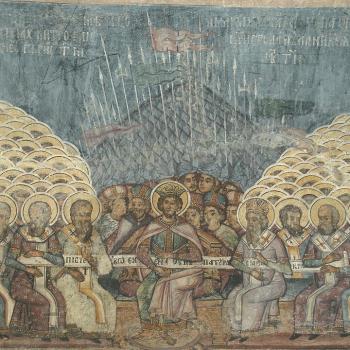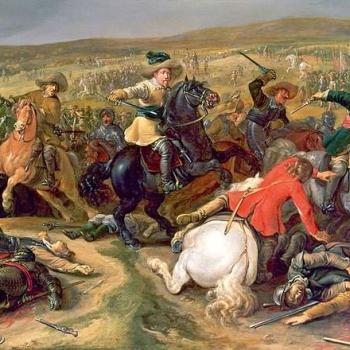Lectionary Reflections on John 6:1-21
Sunday, July 29, 2012
Here they come, down the road toward Jesus. Can you hear their voices getting louder as they approach and taste the dust that has risen from the tramping of their feet? They are coming closer and closer and they are hungry.
Jesus asks Philip, 'Where are we to buy bread for these people to eat?" Philip doesn't realize he's being tested. He responds by pointing to the problem. "Six months wages would not buy enough bread for each of them to get a little." Andrew, however, sees the possibilities: "There is a boy here who has five barley loaves and two fish."
Andrew sees the positive elements. John notes that "there was a great deal of grass in the place" (6:10). That makes it more comfortable to sit down and have a picnic. There are five barley loaves and two fish. There are 12 baskets that appear out of nowhere to hold the leftover food.
When Andrew points Jesus toward the barley loaves and the fish, it's as if, amid all the demands of our lives, we are, just for one bright moment, caught up in Andrew's optimism. But we quickly plummet back to earth with him. For after pausing for a brief, hopeful moment, Philip's negativity rubs off on Andrew. And he asks, "But what are they among so many people?"
His hope is like a synapse trying to leap from a signal-transmitting cell (neuron) to the next cell. The signal is interrupted by pessimism and the hope falls between the cracks. A synapse (from the Greek "to clasp together": syn [together] and haptein [to clasp]) is what allows a signal, either chemical or electrical, to be passed from one cell to another. The channel between cells is called a "gap junction."
When in London a few summers ago, I got used to the woman's voice that gave instructions for exiting the subway before each new stop. "Mind the gap," she would say. Our job as disciples is to "mind the gap."
In this story from John 6, the hopeful signal would have fallen into the gap, had it not been for Jesus' intervention.
Jesus says, "Make the people sit down." With that command, he reminds the disciples of what their job description is—to mind the gap between the five loaves and two fish, and food for all. It is not to question whether there will be a meal. Their job is to make the people sit down and to distribute the meal that Jesus provides.
The disciples' job is to factor Jesus into any challenging situation they may face, and to count on his presence and power from now on. They are to be those who call on the Jesus factor in all situations. What is the Jesus Factor? The Jesus factor is the fact, emphasized over and over again by John, that Jesus is present and ready to help in any situation of need. This is just the first of seven such promises of the Jesus Factor. Jesus is Bread (6:28), Light (8:12), Gate (10:9), Good Shepherd (10:1), Resurrection and Life (11:25), Way, Truth and Life (14:6), and True Vine (15:1).
The disciples' job is to witness to and share that Jesus factor with others.
The people have a job too. And it is not just gaining personal spiritual nourishment from Jesus so they can make it through life's difficulties. The crowd's job is not to run around the countryside pursuing whichever new teacher/healer can meet their physical needs.
In 1719, German Pietist Nicholas Ludwig von Zinzendorf climbed the stone steps of the art gallery in Dusseldorf. It was May 20, 1719, and this was the fifth art gallery he had been to since setting out on the trip a week before. Zinzendorf strolled around, taking in the various masterpieces that were on display. The excursion to the art gallery was much like the others Zinzendorf had made on the trip, until he came to one particular painting. For some reason he felt attracted to it. He stopped and studied it closely. The painting, by Domenico Feti, was titled Ecce Homo (Behold the Man) and it showed Jesus with a crown of thorns on His head. At the bottom of the picture, the artist had painted the words: This I have done for you. What have you done for Me?
In this story, the people's job, like that of the disciples, is to share the Jesus factor, what Jesus has done and continues to do for us. It is to help others "mind the gap" between the momentary optimism of "There is a boy here who has five barley loaves and two fish," and the influx of negativity in "But what are they among so many people?"
In between "Here is what little we have" and "Here are the 12 baskets of leftovers," there is the Jesus factor. Let's not forget to factor Jesus into our daily equations and situations. Let's not forget to share his good news with others.
It means remembering that as our needs are met, we are to share with others.
12/2/2022 9:10:35 PM





